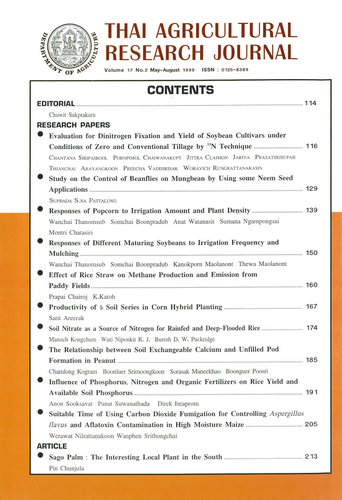Study on the Control of Beanflies on Mungbean by Using Some Neem Seed Applications
DOI:
https://doi.org/10.14456/thaidoa-agres.1999.13Keywords:
neem, beanful, inecticide from plantAbstract
Beanfies are the important pests of mungbean seedlings. The damages caused by these insects make mungbean plants stunt, reduce yield, or die. The seeds of Thai neem trees, Azadirachta indica var. siamensis Valuton have the number of chemical substances showing insecticidal effects to many insect pests. The objective of this study was to investigate the efficacies of some applications of neem seees for pests. The objective of this study was to investigate the efficacies of some applications of neem seeds for controlling beanfies on mungbean. This experiment was conducted in the field at chai Nat Field Crops Research Center during 1994-1995 (September-October). The results showed that the sprayings of aqueous neem seed kernel extracts (ANSKE) conce. 5%(W/V) and over had the best efficacies for controlling both beanfies species, Ophiomyia phaseoli and Melanagromyza sojae, as same as that of monocrotophos. In mungbean sprayed with ANSKE 5%, it was found no O. phaseoli in plants but found M. sojae 2.5-3.0 larvae+pupae (L+P)/40 plants. Instead, in mungbean sprayed with monocrotophos, it was found O. phaseoli 1.0 L+P/40 plants, M. sojae 1.0-8.0 L+P/40 plants but in the untreasted mungbean, it was found O. phaseoli 23.5 L+P/40 plants, M. sojae 17.0-21.3 L+P/40 plants. The ANSKE 5% and 10% had the same efficacy for controlling both species of beanfies. It is recommended that the spraying of ANSK/e 5% to mungbean seedlings should not exceed 4 times due to phytotoxicity. Nevertheless, the placing of neem seed powder near mungbean seeds when planting and the side dressing of neem seed powder near mungbean seedlings after emergence at all rates tested had little efficacy for controlling O. phaseoli but they had no efficacy for controlling M. sojae.
Downloads
Published
How to Cite
Issue
Section
License

This work is licensed under a Creative Commons Attribution-NonCommercial-NoDerivatives 4.0 International License.
Thai Agricultural Research Journal



